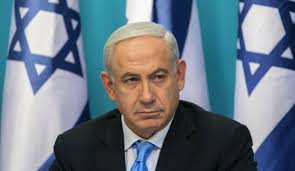
Mar 3, 2015 | The Blog
 Avvertenza: se fate parte dei “negatori dell’Olocausto”, risparmiatevi la lettura di quanto segue. Non fa per voi.
Avvertenza: se fate parte dei “negatori dell’Olocausto”, risparmiatevi la lettura di quanto segue. Non fa per voi.
Per ragioni legate alla mia data di nascita, non ero ancora in vita quando nel 1938 Neville Chamberlain, primo ministro inglese, si ostinò nel cercare un accordo con Hitler, dandogli infine via libera all’annessione dei Sudeti, in quella che è oggi la Repubblica Ceca. Ma tutti conosciamo le conseguenze che quell’azione ha avuto. Il termine appeasement è rimasto associato all’incapacità dell’Inghilterra di leggere le vere intenzioni del dittatore nazista e porta ancora con sé una connotazione di profonda infamia.
Oggi, il Segretario di Stato americano John Kerry è a Ginevra nel grottesco tentativo di far digerire agli iraniani, i nazisti del terzo millennio, un accordo che è comunque pieno di rischi (per Israele e l’Occidente) e facilmente aggirabile per una nazione che da oltre 30 anni fomenta il terrorismo islamico nel mondo. Appeasement puro e semplice, 77 anni dopo la vergogna del Settembre 1938.
Oggi alle 17:00 italiane ho avuto il privilegio di assistere in diretta a un discorso storico, quello del Primo Ministro israeliano, Benjamin Netanyahu, davanti al Congresso USA. Netanyahu era stato invitato dal Portavoce della Camera, John Boehner, ma non da Obama, che ha tipicamente vissuto l’intero episodio come un caso di lesa maestà. (Nell’ordinamento americano, Boehner è il terzo massimo rappresentante dell’esecutivo—dopo il Presidente e il suo vice—e pienamente in diritto di estendere inviti di questo tipo.)
Il discorso di Netanyahu, durato 40 minuti e tenuto nell’eccellente inglese di cui il PM israeliano dispone, voleva ricordare agli americani che il non raggiungere un accordo con l’Iran è molto meglio di siglare un cattivo accordo. L’ultima volta che un negoziatore americano ha avuto il sopravvento interrompendo le trattative è stato durante il negoziato tra Reagan e Gorbaciov, poco meno di 30 anni fa. Ma John Kerry, un ridicolo burattino pieno di sè, non è certo un negoziatore al livello di Ronald Reagan.
Questa volta, sono orgoglioso di poter dire che c’ero anch’io ad assistere a un momento storico come il discorso di Netanyahu . Ma oggi risultavano assenti una serie di personaggi chiave: l’intera Amministrazione Obama si è nascosta dietro un dito snobbando il discorso di Netanyahu e adducendo per la sua assenza una serie di scuse che sarebbero patetiche e imbarazzanti, non solo per la prima potenza mondiale, ma anche per un asilo infantile.
Né Obama né il suo vicepresidente Biden erano presenti alla sessione congiunta del Congresso e le loro giustificazioni ne evidenziano la pochezza morale, sia quella di Obama—che si rivela sempre di più un narcisista permaloso—che quella del suo VP, che si riconferma un imbarazzante minus habens a 360 gradi. (Non è dato sapere dove fosse good ol’ Joe Biden oggi. L’ordine di scuderia era boicottare l’ospite israeliano e lui l’ha fatto, magari chiuso nel suo studio a guardare il soffitto).
Come loro due, circa 50 rappresentanti del partito democratico si sono astenuti dal presenziare, ma l’aula era comunque affollata all’inverosimile e dava realmente l’impressione di essere testimoni di un punto di svolta epocale. L’atmosfera era infatti quella di un momento storico. Sono convinto questo lo sia stato a tutti gli effetti.
Netanyahu è stato interrotto 40 volte dagli applausi dei parlamentari presenti e spesso da standing ovations. Il succo del suo messaggio è stato: la corsa al nucleare dell’Iran rappresenta un pericolo mortale per la sopravvivenza di Israele e per la pace nel mondo. Contiamo sull’aiuto degli Stati Uniti nel porre fine alle ambizioni nucleari dell’Iran, ma siamo pronti a difenderci da soli se questo si riveli necessario. Alla fine del suo discorso, Netanyahu ha infatti pronunciato una frase storica, che preferisco lasciare nella sua versione originale.
For the first time in 100 generations, we, the Jewish people, can defend ourselves.
Per chi volesse leggere l’intero discorso, ve ne allego qui di seguito il testo. E’ un intervento storico, ve lo consiglio.
Trascrizione del discorso di Benjamin Netanyahu il 3/3/2015
Speaker of the House John Boehner, President Pro Tem Senator Orrin Hatch, Senator Minority — Majority Leader Mitch McConnell, House Minority Leader Nancy Pelosi, and House Majority Leader Kevin McCarthy. I also want to acknowledge Senator, Democratic Leader HarryReid. Harry, it’s good to see you back on your feet.
I guess it’s true what they say, you can’t keep a good man down.
My friends, I’m deeply humbled by the opportunity to speak for a third time before the most important legislative body in the world, the U.S. Congress.
I want to thank you all for being here today. I know that my speech has been the subject of much controversy. I deeply regret that some perceive my being here as political. That was never my intention. I want to thank you, Democrats and Republicans, for your common support for Israel, year after year, decade after decade.
I know that no matter on which side of the aisle you sit, you stand with Israel.
The remarkable alliance between Israel and the United States has always been above politics. It must always remain above politics.
Because America and Israel, we share a common destiny, the destiny of promised lands that cherish freedom and offer hope. Israel is grateful for the support of American — of America’s people and of America’s presidents, from Harry Truman to Barack Obama.
We appreciate all that President Obama has done for Israel. Now, some of that is widely known.
Some of that is widely known, like strengthening security cooperation and intelligence sharing, opposing anti-Israel resolutions at the U.N. Some of what the president has done for Israel is less well- known.
I called him in 2010 when we had the Carmel forest fire, and he immediately agreed to respond to my request for urgent aid. In 2011, we had our embassy in Cairo under siege, and again, he provided vital assistance at the crucial moment. Or his support for more missile interceptors during our operation last summer when we took on Hamas terrorists.
In each of those moments, I called the president, and he was there. And some of what the president has done for Israel might never be known, because it touches on some of the most sensitive and strategic issues that arise between an American president and an Israeli prime minister. But I know it, and I will always be grateful to President Obama for that support.
And Israel is grateful to you, the American Congress, for your support, for supporting us in so many ways, especially in generous military assistance and missile defense, including Iron Dome.
Last summer, millions of Israelis were protected from thousands of Hamas rockets because this capital dome helped build our Iron Dome.
Thank you, America. Thank you for everything you’ve done for Israel. My friends, I’ve come here today because, as prime minister of Israel, I feel a profound obligation to speak to you about an issue that could well threaten the survival of my country and the future of my people: Iran’s quest for nuclear weapons. We’re an ancient people. In our nearly 4,000 years of history, many have tried repeatedly to destroy the Jewish people. Tomorrow night, on the Jewish holiday of Purim, we’ll read the Book of Esther. We’ll read of a powerful Persian viceroy named Haman, who plotted to destroy the Jewish people some 2,500 years ago. But a courageous Jewish woman, Queen Esther, exposed the plot and gave for the Jewish people the right to defend themselves against their enemies.
The plot was foiled. Our people were saved. Today the Jewish people face another attempt by yet another Persian potentate to destroy us. Iran’s Supreme Leader Ayatollah Khamenei spews the oldest hatred, the oldest hatred of anti-Semitism with the newest technology. He tweets that Israel must be annihilated — he tweets. You know, in Iran, there isn’t exactly free Internet. But he tweets in English that Israel must be destroyed. For those who believe that Iran threatens the Jewish state, but not the Jewish people, listen to Hassan Nasrallah, the leader of Hezbollah, Iran’s chief terrorist proxy. He said: If all the Jews gather in Israel, it will save us the trouble of chasing them down around the world.
But Iran’s regime is not merely a Jewish problem, any more than the Nazi regime was merely a Jewish problem. The 6 million Jews murdered by the Nazis were but a fraction of the 60 million people killed in World War II. So, too, Iran’s regime poses a grave threat, not only to Israel, but also the peace of the entire world. To understand just how dangerous Iran would be with nuclear weapons, we must fully understand the nature of the regime.
The people of Iran are very talented people. They’re heirs to one of the world’s great civilizations. But in 1979, they were hijacked by religious zealots — religious zealots who imposed on them immediately a dark and brutal dictatorship.
That year, the zealots drafted a constitution, a new one for Iran. It directed the revolutionary guards not only to protect Iran’s borders, but also to fulfill the ideological mission of jihad. The regime’s founder, Ayatollah Khomeini, exhorted his followers to “export the revolution throughout the world.”
I’m standing here in Washington, D.C. and the difference is so stark. America’s founding document promises life, liberty and the pursuit of happiness. Iran’s founding document pledges death, tyranny, and the pursuit of jihad. And as states are collapsing across the Middle East, Iran is charging into the void to do just that. Iran’s goons in Gaza, its lackeys in Lebanon, its revolutionary guards on the Golan Heights are clutching Israel with three tentacles of terror. Backed by Iran, Assad is slaughtering Syrians. Back by Iran, Shiite militias are rampaging through Iraq. Back by Iran, Houthis are seizing control of Yemen, threatening the strategic straits at the mouth of the Red Sea. Along with the Straits of Hormuz, that would give Iran a second choke-point on the world’s oil supply.
Just last week, near Hormuz, Iran carried out a military exercise blowing up a mock U.S. aircraft carrier. That’s just last week, while they’re having nuclear talks with the United States. But unfortunately, for the last 36 years, Iran’s attacks against the United States have been anything but mock. And the targets have been all too real. Iran took dozens of Americans hostage in Tehran, murdered hundreds of American soldiers, Marines, in Beirut, and was responsible for killing and maiming thousands of American service men and women in Iraq and Afghanistan.
Beyond the Middle East, Iran attacks America and its allies through its global terror network. It blew up the Jewish community center and the Israeli embassy in Buenos Aires. It helped Al Qaeda bomb U.S. embassies in Africa. It even attempted to assassinate the Saudi ambassador, right here in Washington, D.C. In the Middle East, Iran now dominates four Arab capitals, Baghdad, Damascus, Beirut and Sanaa. And if Iran’s aggression is left unchecked, more will surely follow. So, at a time when many hope that Iran will join the community of nations, Iran is busy gobbling up the nations.
We must all stand together to stop Iran’s march of conquest, subjugation and terror.
Now, two years ago, we were told to give President Rouhani and Foreign Minister Zarif a chance to bring change and moderation to Iran. Some change! Some moderation!
Rouhani’s government hangs gays, persecutes Christians, jails journalists and executes even more prisoners than before. Last year, the same Zarif who charms Western diplomats laid a wreath at the grave of Imad Mughniyeh. Imad Mughniyeh is the terrorist mastermind who spilled more American blood than any other terrorist besides Osama bin Laden. I’d like to see someone ask him a question about that. Iran’s regime is as radical as ever, its cries of “Death to America,” that same America that it calls the “Great Satan,” as loud as ever. Now, this shouldn’t be surprising, because the ideology of Iran’s revolutionary regime is deeply rooted in militant Islam, and that’s why this regime will always be an enemy of America. Don’t be fooled. The battle between Iran and ISIS doesn’t turn Iran into a friend of America.
Iran and ISIS are competing for the crown of militant Islam. One calls itself the Islamic Republic. The other calls itself the Islamic State. Both want to impose a militant Islamic empire first on the region and then on the entire world. They just disagree among themselves who will be the ruler of that empire. In this deadly game of thrones, there’s no place for America or for Israel, no peace for Christians, Jews or Muslims who don’t share the Islamist medieval creed, no rights for women, no freedom for anyone. So when it comes to Iran and ISIS, the enemy of your enemy is your enemy.
The difference is that ISIS is armed with butcher knives, captured weapons and YouTube, whereas Iran could soon be armed with intercontinental ballistic missiles and nuclear bombs. We must always remember — I’ll say it one more time — the greatest dangers facing our world is the marriage of militant Islam with nuclear weapons. To defeat ISIS and let Iran get nuclear weapons would be to win the battle, but lose the war. We can’t let that happen.
But that, my friends, is exactly what could happen, if the deal now being negotiated is accepted by Iran. That deal will not prevent Iran from developing nuclear weapons. It would all but guarantee that Iran gets those weapons, lots of them. Let me explain why. While the final deal has not yet been signed, certain elements of any potential deal are now a matter of public record. You don’t need intelligence agencies and secret information to know this. You can Google it. Absent a dramatic change, we know for sure that any deal with Iran will include two major concessions to Iran. The first major concession would leave Iran with a vast nuclear infrastructure, providing it with a short break-out time to the bomb. Break-out time is the time it takes to amass enough weapons-grade uranium or plutonium for a nuclear bomb.
According to the deal, not a single nuclear facility would be demolished. Thousands of centrifuges used to enrich uranium would be left spinning. Thousands more would be temporarily disconnected, but not destroyed. Because Iran’s nuclear program would be left largely intact, Iran’s break-out time would be very short — about a year by U.S. assessment, even shorter by Israel’s. And if — if Iran’s work on advanced centrifuges, faster and faster centrifuges, is not stopped, that break-out time could still be shorter, a lot shorter. True, certain restrictions would be imposed on Iran’s nuclear program and Iran’s adherence to those restrictions would be supervised by international inspectors. But here’s the problem. You see, inspectors document violations; they don’t stop them.
Inspectors knew when North Korea broke to the bomb, but that didn’t stop anything. North Korea turned off the cameras, kicked out the inspectors. Within a few years, it got the bomb. Now, we’re warned that within five years North Korea could have an arsenal of 100 nuclear bombs. Like North Korea, Iran, too, has defied international inspectors. It’s done that on at least three separate occasions — 2005, 2006, 2010. Like North Korea, Iran broke the locks, shut off the cameras.
Now, I know this is not gonna come a shock — as a shock to any of you, but Iran not only defies inspectors, it also plays a pretty good game of hide-and-cheat with them. The U.N.’s nuclear watchdog agency, the IAEA, said again yesterday that Iran still refuses to come clean about its military nuclear program. Iran was also caught — caught twice, not once, twice — operating secret nuclear facilities in Natanz and Qom, facilities that inspectors didn’t even know existed. Right now, Iran could be hiding nuclear facilities that we don’t know about, the U.S. and Israel. As the former head of inspections for the IAEA said in 2013, he said, “If there’s no undeclared installation today in Iran, it will be the first time in 20 years that it doesn’t have one.” Iran has proven time and again that it cannot be trusted. And that’s why the first major concession is a source of great concern. It leaves Iran with a vast nuclear infrastructure and relies on inspectors to prevent a breakout. That concession creates a real danger that Iran could get to the bomb by violating the deal.
But the second major concession creates an even greater danger that Iran could get to the bomb by keeping the deal. Because virtually all the restrictions on Iran’s nuclear program will automatically expire in about a decade.
Now, a decade may seem like a long time in political life, but it’s the blink of an eye in the life of a nation. It’s a blink of an eye in the life of our children. We all have a responsibility to consider what will happen when Iran’s nuclear capabilities are virtually unrestricted and all the sanctions will have been lifted. Iran would then be free to build a huge nuclear capacity that could product many, many nuclear bombs. Iran’s Supreme Leader says that openly. He says, Iran plans to have 190,000 centrifuges, not 6,000 or even the 19,000 that Iran has today, but 10 times that amount — 190,000 centrifuges enriching uranium. With this massive capacity, Iran could make the fuel for an entire nuclear arsenal and this in a matter of weeks, once it makes that decision.
My long-time friend, John Kerry, Secretary of State, confirmed last week that Iran could legitimately possess that massive centrifuge capacity when the deal expires. Now I want you to think about that. The foremost sponsor of global terrorism could be weeks away from having enough enriched uranium for an entire arsenal of nuclear weapons and this with full international legitimacy. And by the way, if Iran’s Intercontinental Ballistic Missile program is not part of the deal, and so far, Iran refuses to even put it on the negotiating table. Well, Iran could have the means to deliver that nuclear arsenal to the far-reach corners of the earth, including to every part of the United States.
So you see, my friends, this deal has two major concessions: one, leaving Iran with a vast nuclear program and two, lifting the restrictions on that program in about a decade. That’s why this deal is so bad. It doesn’t block Iran’s path to the bomb; it paves Iran’s path to the bomb. So why would anyone make this deal? Because they hope that Iran will change for the better in the coming years, or they believe that the alternative to this deal is worse?
Well, I disagree. I don’t believe that Iran’s radical regime will change for the better after this deal. This regime has been in power for 36 years, and its voracious appetite for aggression grows with each passing year. This deal would wet appetite — would only wet Iran’s appetite for more. Would Iran be less aggressive when sanctions are removed and its economy is stronger? If Iran is gobbling up four countries right now while it’s under sanctions, how many more countries will Iran devour when sanctions are lifted? Would Iran fund less terrorism when it has mountains of cash with which to fund more terrorism? Why should Iran’s radical regime change for the better when it can enjoy the best of both world’s: aggression abroad, prosperity at home?
This is a question that everyone asks in our region. Israel’s neighbors — Iran’s neighbors know that Iran will become even more aggressive and sponsor even more terrorism when its economy is unshackled and it’s been given a clear path to the bomb. And many of these neighbors say they’ll respond by racing to get nuclear weapons of their own. So this deal won’t change Iran for the better; it will only change the Middle East for the worse. A deal that’s supposed to prevent nuclear proliferation would instead spark a nuclear arms race in the most dangerous part of the planet. This deal won’t be a farewell to arms. It would be a farewell to arms control. And the Middle East would soon be crisscrossed by nuclear tripwires. A region where small skirmishes can trigger big wars would turn into a nuclear tinderbox.
If anyone thinks — if anyone thinks this deal kicks the can down the road, think again. When we get down that road, we’ll face a much more dangerous Iran, a Middle East littered with nuclear bombs and a countdown to a potential nuclear nightmare.
Ladies and gentlemen, I’ve come here today to tell you we don’t have to bet the security of the world on the hope that Iran will change for the better. We don’t have to gamble with our future and with our children’s future. We can insist that restrictions on Iran’s nuclear program not be lifted for as long as Iran continues its aggression in the region and in the world.
Before lifting those restrictions, the world should demand that Iran do three things. First, stop its aggression against its neighbors in the Middle East. Second… Second, stop supporting terrorism around the world. And third, stop threatening to annihilate my country, Israel, the one and only Jewish state. Thank you.
If the world powers are not prepared to insist that Iran change its behavior before a deal is signed, at the very least they should insist that Iran change its behavior before a deal expires. If Iran changes its behavior, the restrictions would be lifted. If Iran doesn’t change its behavior, the restrictions should not be lifted. If Iran wants to be treated like a normal country, let it act like a normal country.
My friends, what about the argument that there’s no alternative to this deal, that Iran’s nuclear know-how cannot be erased, that its nuclear program is so advanced that the best we can do is delay the inevitable, which is essentially what the proposed deal seeks to do? Well, nuclear know-how without nuclear infrastructure doesn’t get you very much. A racecar driver without a car can’t drive. A pilot without a plan can’t fly. Without thousands of centrifuges, tons of enriched uranium or heavy water facilities, Iran can’t make nuclear weapons.
Iran’s nuclear program can be rolled back well-beyond the current proposal by insisting on a better deal and keeping up the pressure on a very vulnerable regime, especially given the recent collapse in the price of oil.
Now, if Iran threatens to walk away from the table — and this often happens in a Persian bazaar — call their bluff. They’ll be back, because they need the deal a lot more than you do.
And by maintaining the pressure on Iran and on those who do business with Iran, you have the power to make them need it even more. My friends, for over a year, we’ve been told that no deal is better than a bad deal. Well, this is a bad deal. It’s a very bad deal. We’re better off without it.
Now we’re being told that the only alternative to this bad deal is war. That’s just not true. The alternative to this bad deal is a much better deal. A better deal that doesn’t leave Iran with a vast nuclear infrastructure and such a short break-out time. A better deal that keeps the restrictions on Iran’s nuclear program in place until Iran’s aggression ends.
A better deal that won’t give Iran an easy path to the bomb. A better deal that Israel and its neighbors may not like, but with which we could live, literally. And no country… … no country has a greater stake — no country has a greater stake than Israel in a good deal that peacefully removes this threat.
Ladies and gentlemen, history has placed us at a fateful crossroads. We must now choose between two paths. One path leads to a bad deal that will at best curtail Iran’s nuclear ambitions for a while, but it will inexorably lead to a nuclear-armed Iran whose unbridled aggression will inevitably lead to war.
The second path, however difficult, could lead to a much better deal, that would prevent a nuclear-armed Iran, a nuclearized Middle East and the horrific consequences of both to all of humanity.
You don’t have to read Robert Frost to know. You have to live life to know that the difficult path is usually the one less traveled, but it will make all the difference for the future of my country, the security of the Middle East and the peace of the world, the peace, we all desire.
My friend, standing up to Iran is not easy. Standing up to dark and murderous regimes never is. With us today is Holocaust survivor and Nobel Prize winner Elie Wiesel.
Elie, your life and work inspires to give meaning to the words, “never again.” And I wish I could promise you, Elie, that the lessons of history have been learned. I can only urge the leaders of the world not to repeat the mistakes of the past.
Not to sacrifice the future for the present; not to ignore aggression in the hopes of gaining an illusory peace. But I can guarantee you this, the days when the Jewish people remained passive in the face of genocidal enemies, those days are over.
We are no longer scattered among the nations, powerless to defend ourselves. We restored our sovereignty in our ancient home. And the soldiers who defend our home have boundless courage. For the first time in 100 generations, we, the Jewish people, can defend ourselves.
This is why — this is why, as a prime minister of Israel, I can promise you one more thing: Even if Israel has to stand alone, Israel will stand. But I know that Israel does not stand alone. I know that America stands with Israel. I know that you stand with Israel. You stand with Israel, because you know that the story of Israel is not only the story of the Jewish people but of the human spirit that refuses again and again to succumb to history’s horrors.
Facing me right up there in the gallery, overlooking all of us in this (inaudible) chamber is the image of Moses. Moses led our people from slavery to the gates of the Promised Land. And before the people of Israel entered the land of Israel, Moses gave us a message that has steeled our resolve for thousands of years. I leave you with his message today, (SPEAKING IN HEBREW), “Be strong and resolute, neither fear nor dread them.” My friends, may Israel and America always stand together, strong and resolute. May we neither fear nor dread the challenges ahead. May we face the future with confidence, strength and hope. May God bless the state of Israel and may God bless the United States of America.
Thank you. Thank you very much. Thank you all. You’re wonderful. Thank you, America. Thank you. Thank you.




 Avvertenza: se fate parte dei “negatori dell’Olocausto”, risparmiatevi la lettura di quanto segue. Non fa per voi.
Avvertenza: se fate parte dei “negatori dell’Olocausto”, risparmiatevi la lettura di quanto segue. Non fa per voi.




